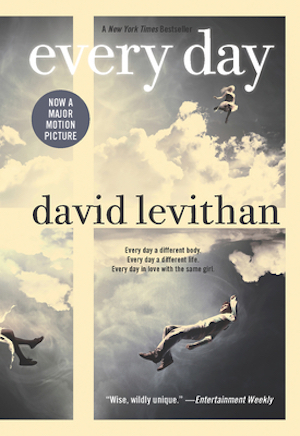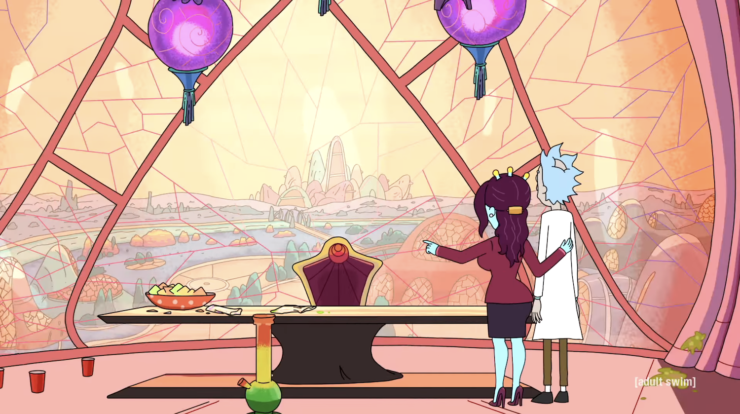Science fiction and fantasy stretch limits. They explore infinite what-ifs, using speculation like rocket fuel to blast us off into unknown worlds. The genre can also offer more grounded stories, ruminating on different aspects of human experience through a magical or scientific lens. And while I enjoy a vast new world as much as the next SFF reader or viewer, I also seek out stories that use the human psyche as a playground.
Pitting a character against their own consciousness can yield riveting stories, and consciousness can be as effective a setting as any in which to unfold a captivating sci-fi or fantasy tale. In recent years, writers and creators have embraced this concept in a number of fascinating ways, spinning yarns—some humorous or touching, some thrilling or disturbing, and sometimes all at once—that stretch the limits of known consciousness.
Here are a few of my favorite SFF stories that fiddle with consciousness to great effect. I hope you’ll add your own additions to the list in the comments below!
Every Day by David Levithan

Each day, A (that’s the character’s name) wakes up in a new body—someone else’s body, to be clear. A takes over that person’s life for a single day, waking up in a new body the next day, and the next, and so on.
In David Levithan’s Every Day, A wakes up in Justin’s body and falls for Rhiannon, Justin’s girlfriend. On subsequent days, A awakens in new bodies, usually inhabiting people who are around the same age and in the same geographic area. A begins to meet with Rhiannon regularly, explaining the strange life they lead.
Even A doesn’t truly understand their existence. Effectively, A hijacks a teen’s life every day, removing their free will, their ability to make choices in line with their thoughts and feelings. A is almost parasitic this way, but they often try their best to avoid doing too much damage to the person’s daily routine.
Every Day plays with its core conceit to marvelous effect, exploring the implications of what amounts to a daily consciousness takeover. Slowly, A realizes a relationship with Rhiannon might not be viable due to the nature of A’s existence. The book offers a unique take on a new type of consciousness and its impact on two characters who function differently within the larger world.
Moon Knight

For our next story about stretching the limits of consciousness, it’s time to welcome the MCU’s weirdest hero yet. With only loose canonical connections to the MCU so far, the Oscar Isaac-led vehicle Moon Knight has room to shed a lot of the formulaic storytelling so prevalent in other Marvel content. The series begins messing with its audience right away, as we discover that our protagonist is one man serving as a superheroic vessel for (at least) two psyches.
Considering the season one ending, Moon Knight plays things pretty tame in its first six episodes. We’re led to believe Marc Spector is sharing Steven Grant’s body and mind occasionally taking the driver’s seat to lay the whomp on some wrongdoers. The episode-six cliffhanger, though, suggests we’ve only seen the beginning of Moon Knight’s reach.
To be honest, I don’t think the first season of Moon Knight did all that well with this concept, but that final stinger left me hyped for whatever comes next, if indeed we get more of the series. Still, the arc we do have is a trippy tale, and it revels in the mysteries that stem from competing identities sharing the same cranial real estate.
Severance

I’ve already written at length about Apple TV’s masterpiece of corporate sci-fi, but it deserves a mention here, too. The core concept of allowing workers to separate their consciousness into two parts, one for work and one for personal life, is an incredible premise. The show elevates the concept, crafting an edge-of-your-seat mystery thriller around it while contemplating the nature of corporate work in the age of big-tech and billionaires.
If you could separate your work self from your personal self, would you? It might seem enticing at first, but the benefits you may expect—happier personal life, more fulfilling hobbies, less work-think outside of the office—aren’t exactly a given.
Severance’s story opens up various metaphorical cans of worms, leading the cadre of workers at the show’s heart (spearheaded by Mark, played by Adam Scott, in a truly impeccable performance) to explore the inner workings of Lumen Industries and discover the company’s real goals. But it’s not easy when you’re a Severed employee. Eventually, the “outies,” or personal-life sides of the Severed, begin to unravel threads of the narrative as well.
There’s a lot of juicy sci-fi consciousness exploration in Severance, and the show is just heating up. Season one ends with a huge cliffhanger, leaving many of its unsolved mysteries to stew while we wait impatiently for another batch of episodes.
Venom and Venom 2

If Moon Knight is the somewhat serious take on superpowered consciousness-sharing, Venom is its wacky cousin. Venom 2 is its other wacky cousin (this time with a side order of Woody Harrelson).
I’m not here to defend the quality of Venom or its sequel. Both movies have issues; the first suffers from the same problem as Game of Thrones’ “The Long Night,” namely an “epic” battle set against a too-dark background. It’s one of the film’s more forgivable foibles, too.
And yet, it’s hard for me to watch Tom Hardy argue with a witty and ravenous alien symbiote without a huge smile on my face. Neither Venom nor its sequel offers a deep exploration of the symbiote’s implications. Instead, the movies have fun with the concept. Sometimes it’s okay to relish the humor of a situation without wringing it thematically dry, and that’s what Venom does.
If you want even more Venom goodness, I recommend the symbiote’s arc in Spider-Man: The Animated Series on Disney+.
Rick And Morty, “Auto Erotic Assimilation”

Leave it to Dan Harmon, Justin Roiland and Co. to take a tried-and-true sci-fi concept and completely flip it on its head. “Auto Erotic Assimilation” introduces Unity, a hive mind with whom Rick has had an ongoing on-again, off-again tryst.
Any other hive mind story would highlight the downfalls of a homogenous, single-minded entity. “Auto Erotic Assimilation” does that to some degree, though it also shows us a society that, it could be argued, is better off controlled by Unity’s far-reaching consciousness. To be clear, I’m not championing the use of hive minds to solve societal problems, but damn, Rick & Morty makes some interesting points as we follow the characters through its manic, multiversal sci-fi playground.
My favorite part of the episode, however, is Rick’s relationship with Unity. The man is so smart, and the series tells us his superior intelligence causes him to be bored to the point of being self-destructive. Rick craves sensation to the point where he’ll drive an entire hive mind in command of a literal planet to break up with him. The combined power of a billion consciousnesses can’t keep up with Rick. He’s so reckless and chaotic that the hive mind leaves him, probably to try things out with Patton Oswalt’s Beta-Seven, a neighboring hive mind clearly crushing on Unity. Even an entity capable of assimilating an entire planet can’t handle the singular force of Rick Sanchez.
Cole Rush writes words. A lot of them. For the most part, you can find those words at The Quill To Live or on Twitter @ColeRush1. He voraciously reads epic fantasy and science-fiction, seeking out stories of gargantuan proportions and devouring them with a bookwormish fervor. His favorite books are: The Divine Cities Series by Robert Jackson Bennett, The Long Way To A Small, Angry Planet by Becky Chambers, and The House in the Cerulean Sea by TJ Klune.











I feel like Rick and Morty has a ton of episodes that go along with this theme. But hive mind is def probably the best example.
The FX series Legion does this very well.
Claire North’s Touch is about a character who possesses a person, and who can switch from one host to the next by touching them. I strongly recommend it.
its the best conflict possible in a story. Great list
Ann Leckie’s Imperial Radch trilogy explores this from a few angles, specially with the wonderful main character Breq/Justice of Toren.
I really enjoyed Awake from 2012 with Jason Isaacs as a detective who, following a car crash is in one reality where his wife survived but his son died. When he goes to sleep … he is seemingly awake again, except his son is alive and his wife is dead. And there are other differences (his partner is different, etc.) No sleep for the wicked…
Terrific concept and (I felt) an amazing exploration of how people cope with grief and loss. One perfect season.
Two words. Rogue Moon.
There is a short web series and a Korean feature film that also cover the same idea as Levithan’s “Every Day”
See: https://en.wikipedia.org/wiki/The_Beauty_Inside_(web_series)
See: https://en.wikipedia.org/wiki/The_Beauty_Inside_(2015_film)
Two more words: Fight Club.
The Locked Tomb series, particularly Harrow the Ninth (and will almost certainly feature even more in Nona the Ninth), deals heavily with this concept. It is one of the dizzying, addictive elements of these books that Muir handles deftly. In my opinion the series is infinitely rereadable.
Season 6 of The 100 explores this in some fun ways.
Kim Stanley Robinson’s The Years of Rice and Salt is a good take on this too.
Serial Experiments Lain — I hope it’s not a spoiler to say that the protagonist has at least two, possibly three, consciousnesses, not necessarily sharing the same body (maybe I should say transcending the body).
If you want to know what current neuroscientists think about consciousness, there are two recent books that I heartily recommend:
—The Revelations by Erik Hoel: An intense novel in which the way the main character tries to unveil the workings of consciousness closely resembles the workings of consciousness itself.
—Being You by Anil Seth: a treatise on consciousness that is as clear as it is groundbreaking. I’d say required reading for any (SF) author who wishes to make consciousness the major theme in their novel.
And many thanks for the Rick and Morty mention, one of the best things to happen to SF in a long time.
Peter Watts’ BLINDSIGHT also deals with consciousness, and the possibility of an intelligent species without it.
Crompton Divided by Robert Shekley (1978) features a protagonist, Alistair Crompton, who suffered from multiple personality disorder — so his other personalities were separated and inserted into artificial bodies.